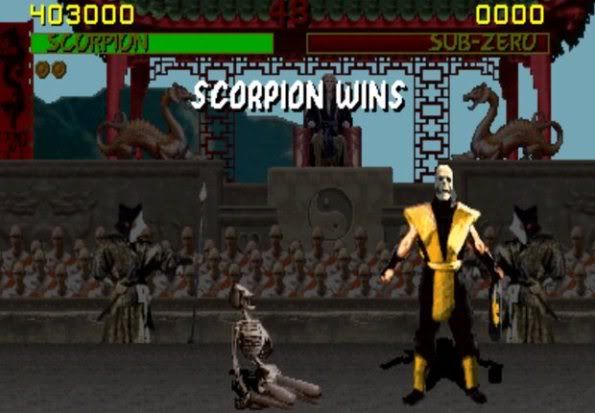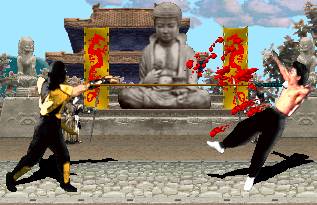
Geoffrey probably wanted to kick me in the face for real this time. We were playing the original Mortal Kombat — not the kiddie Super Nintendo version, mind you; no, he had the Sega Genesis version, also known as the excessive blood-splatter, rip-your-opponents-to-pieces version. It was awesome. It also taught me how to be the most annoying video game opponent ever.
 The sad truth is that I suck at fighting games, always have, and probably always will. Mortal Kombat was my introduction to the genre, and I died. A lot. The only obvious solution that my 5th-grade brain could think of was to complain about my lack of knowledge, thereby convincing Geoffrey to teach me one special move: Scorpion's harpoon.
The sad truth is that I suck at fighting games, always have, and probably always will. Mortal Kombat was my introduction to the genre, and I died. A lot. The only obvious solution that my 5th-grade brain could think of was to complain about my lack of knowledge, thereby convincing Geoffrey to teach me one special move: Scorpion's harpoon.
This was a mistake, because if there's one thing that I was able to master in Mortal Kombat, it was that harpoon move, and I used it over and over and over. My strategy was essentially this: Harpoon opponent, uppercut opponent, repeat. Fortunately, Geoffrey was new enough to the game that he had a hard time defending against this unassailable strategy. But as you might imagine, he quickly tired of my shenanigans.
I wish I could say that this tendency was temporary and that my gaming matured with age. Unfortunately, the insidious delight of repeatedly exploiting a single move made its way into my Super Smash Bros. strategy as well, in which I would play Samus Aran and constantly jump around doing her screw attack. In competitive multiplayer, it is tempting to exploit imbalances in the game or to adopt a playstyle that privileges rote repetition rather than creativity. Video games offer the potential for creating new approaches to competitive difficulties, but if we adopt a "winning is the only thing" attitude, then the experience loses nearly all of its value.
After losing numerous matches, Geoffrey felt that the experience had lost so much of its value that he turned off the game in frustration, and we went to the kitchen for a snack. We didn't talk much; I was feeling quite proud of my newfound prowess, and Geoffrey was probably regretting inviting me over. But our silence was interrupted by the eruption of two-foot-tall flames from the toaster.
Apparently, in his distraction, Geoffrey had allowed his Pop-Tarts to overstay their welcome, and the toaster quickly became a blazing inferno. Although Geoffrey's panicked parents quickly put the fire out, the terror of seeing those flames licking the bottom of the kitchen cabinets put a damper on my visit. So I suppose the moral of my anecdote is this: Don't be an ass, or your friend might get distracted, fail to pay attention to the toaster, and nearly burn his house down.
In all seriousness, though, how we play a game says something about us. In my youth, my playing said I was a jerk. Now that I'm almost 30, I think I have finally moved away from these tendencies. I want my children's attitude regarding competitive gaming to be quite different from the one I held as a child, and leading by example is a good way to start. Imagine what gaming communities could become if we shared such an approach to our pastime. Together we can prevent kitchen fires.
This post is part of my Portrait of a Victorian Gamer series, in which I highlight significant moments from my gaming past, consider the connections between gaming and my professional life as a graduate student studying Victorian literature, and contemplate the common cultural significance of gaming and literature. You can find earlier entries in this series here.
VentureBeat's mission is to be a digital town square for technical decision-makers to gain knowledge about transformative enterprise technology and transact. Learn More
